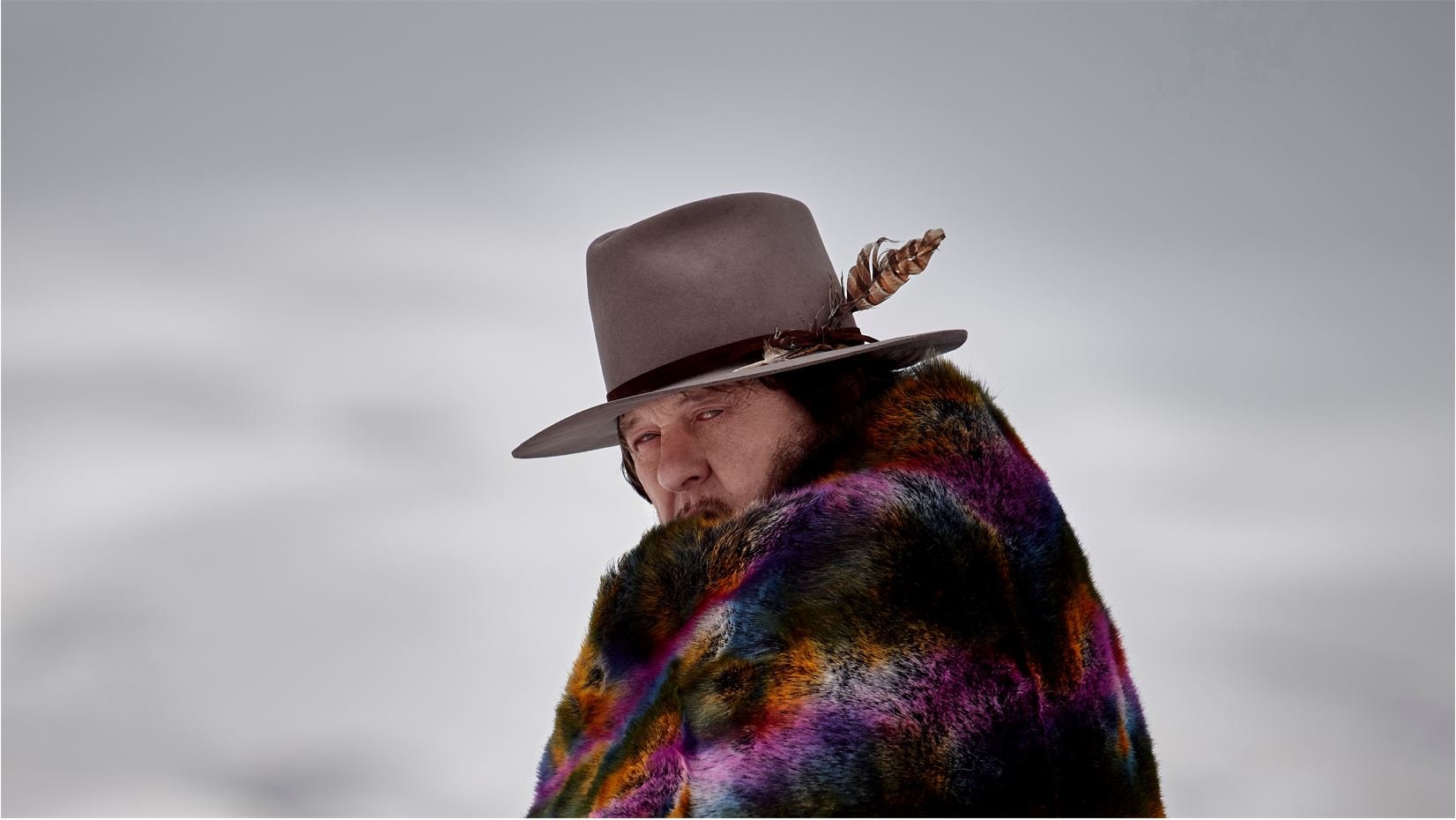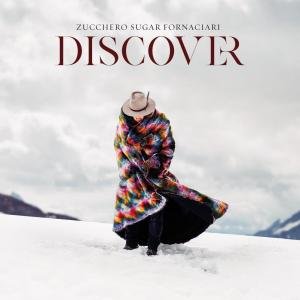Zucchero: oro, incenso e cover
In occasione dell’uscita di ‘Discover’, Sugar Fornaciari ci racconta tutto il suo mondo in questa sana e consapevole intervista (anche in formato video)
18 Novembre 2021
di Simone Sacco

Zucchero mi attende al dodicesimo piano di un noto albergo milanese. Fuori c’è un tempo da lupi mentre in questa calda suite fervono i preparativi mediatici per il lancio di Discover, il primo cover album della sua carriera. 18 brani, sommando la versione tradizionale a quella deluxe, che spaziano da canzoni embrionali scritte da Bono e Michael Stipe (e poi perfezionate dallo stesso Sugar) a monumenti equestri del pop italiano (Fiore di Maggio, Con Te Partirò) fino a duetti virtuali con Fabrizio De Andrè (Ho Visto Nina Volare), altri meno virtuali con Mamhood (la Natural Blues di Moby), merce d’alta classifica (Wicked Game di Chris Isaak, The Scientist dei Coldplay), gemme del passato (una High Flyin’ Bird che ricordiamo in veste folk-psichedelica grazie ai Jefferson Airplane) e tanto altro ancora. Addirittura momenti che sgorgano dalla creatività di Roger Waters, Genesis e Trent Reznor. Una vera e propria – passateci la battutaccia – “coverdose d’amore” che il signor Fornaciari ha messo assieme un po’ per ottimizzare il tempo perduto (il tour mondiale del suo precedente album ‘D.O.C.’ in pratica non è mai cominciato per via del Covid), un po’ per dirci che lui “still got the blues”. Il Blues (e non ci riferiamo solo al suo capolavoro del 1987) ce l’ha ancora bello impresso su di sé.
Sugar, mi è sempre sembrato alquanto strano che tu, pur essendo un grandissimo appassionato di musica altrui, non avessi mai pensato di realizzare un cover album fino ad oggi. E invece è andata proprio così…
In realtà l’idea andava e veniva nella mia testa, ma poi – sai com’è – gli impegni promozionali, le tournée infinite, il pensiero che corre immancabilmente al prossimo disco, eccetera. Dentro di me cercavo un momento particolare per dedicarmi ad un progetto come ‘Discover’ e purtroppo l’occasione è coincisa con l’arrivo della pandemia globale… (sospira). In quei tristi mesi di lockdown stavo a casa mia, nel mio studio privato, e per passare il tempo continuavo a “spogliare” le canzoni che avevo di più amato nella mia vita. Mi sono detto: “Ok, ora o mai più”.
In Italia va poco il formato del cover album. A parte grandi interpreti tipo Mina o Ornella Vanoni, abbonate da sempre alle re-interpretazioni, mi vengono in mente solo gli esperimenti di Franco Battiato (i tre capitoli di Fleurs), Gino Paoli (Appropriazione Indebita), Gianna Nannini (Hitalia) e Luca Carboni (Musiche Ribelli). Come mai secondo te?
Esatto, qui da noi c’è sicuramente meno appeal per progetti del genere; eppure se guardi all’estero personaggi come Johnny Cash (le famose ‘American Recordings’ con Rick Rubin. Ndr), David Bowie (‘Pin Ups’. Ndr), Rod Stewart e Eric Clapton sono stati venerati da pubblico e critica quando si sono lanciati nelle reinterpretazioni di brani altrui. Non lo so, forse è meno impegnativo dal punto di vista emotivo cantare una canzone scritta da qualcun altro; e noi italiani, come ben sai, restiamo i re assoluti dell’emotività… (sorride)
Discover è un cover album non canonico. Nel senso che, come dici tu, gli arrangiamenti originali dei pezzi sono stati “spogliati” fino all’osso mentre le melodie restano abbastanza nascoste e sommesse…
Sì, questo è un po’ il mio modus operandi degli ultimi tre/quattro anni: liberarmi dalle produzioni pompose, quelle fondate su tanti suoni. Se ora pensassi ad una canzone – originale o meno – mi verrebbe subito in mente la mia voce, una chitarra acustica e un’atmosfera minimalista di contorno. Ecco, mi concentrerei su strumenti che non invadano tutta la gamma delle frequenze.
A tal proposito, pensi che una come Elisa avrebbe vinto comunque il Festival di Sanremo 2001 se si fosse presentata con questa nuova versione di Luce (Tramonti a Nord Est) presente in Discover?
Be’, se parliamo di quel Festival di vent’anni fa, diamo anche merito al bellissimo arrangiamento creato in quel caso da Corrado Rustici. ‘Luce’ ormai è un brano a tutti gli effetti di Elisa, anche se quel testo all’epoca lo abbiamo scritto assieme. E, quando si è trattato di includerla in ‘Discover’, in un primo momento non me la sono sentita: poteva anche passare per una scelta ovvia, scontata…
Una sorta di auto-cover?
Già; ma poi ho ascoltato quei suoni di tastiera, quel ritmo anomalo e mi sono detto: “Sugar, qui di pop ne è rimasto ben poco”. E quindi l’ho messa in scaletta. Per tornare alla tua domanda, dire se Elisa avrebbe vinto Sanremo anche con questa versione di ‘Luce’, who knows, chi può saperlo (sorride)…
La tua versione di Follow You Follow Me dei Genesis ha un’anima smaccatamente irish/irlandese che non avevo mai notato nell’originale del 1978. Proviene dai tuoi anni di balera? Quando, nel cuore degli anni Settanta, facevi le ore piccole nei locali suonando e cantando in queste romantiche e misconosciute cover band?
(alza il pollice) Sono molto d’accordo con te. Sì, ‘Follow You Follow Me’ è proprio quella roba lì: un tributo a quando ero un signor nessuno e, coi miei colleghi, si suonava la musica complessa di Genesis, Jethro Tull, Pink Floyd e Moody Blues. Il gestore del locale ci dava il via libera e noi per un’ora e mezza ci lanciavamo in qualsiasi cosa.
Tornando a Collins/Banks/Rutherford…
Ah, i Genesis! Li adoro da sempre. Mi piacciono sia in versione progressive quando scrivono pezzi strutturati come ‘Carpet Crawlers’, ‘Looking For Someone’ e ‘Time Table’ oppure quando si dedicano a canzoni più pop. Come ‘Follow You Follow Me’, dove c’è sia l’Irlanda nel riff di chitarra sia il New Orleans shuffle nelle parti di batteria. In questo caso merito sicuramente di Phil Collins!
Riguardo a Collins: hai mai provato a metterti in contatto con lui per fare qualcosa assieme? Magari negli anni Ottanta/primi ‘Novanta quando sia tu che lui eravate sulla vetta…
Guarda, conosco personalmente sia Collins sia Peter Gabriel, visto che ho inciso ben due dischi nei suoi Real World Studios di Bath (‘Oro, Incenso e Birra’ nel 1989 e ‘Shake’ nel 2001. Ndr). Tra l’altro un cugino della mia compagna stava di casa a Ginevra, dove abitava anche Phil, e quindi diverse volte c’è stata l’occasione di incontrarlo, ma poi, per un motivo o per l’altro, non se ne mai fatto niente.
Peccato.
Pazienza. Tanto con Phil ci avevo già avuto a che fare ai tempi delle numerose date che Eric Clapton ed io tenemmo alla Royal Albert Hall di Londra nel 1990. Durante quelle serate ogni tanto lui si presentava per suonare la batteria nella band di Eric. Un gran bel tipo, Collins.
Non pensi che manchi una cover di Sting in Discover? Tu in fondo sei stato il padrino di sua figlia Coco e con l’ex Police ha duettato spesso in carriera…
Be’, con Gordon ho realizzato la versione italiana della sua ‘Mad About You’ che, nel 1991, diventò appunto ‘Muoio per Te’. Ok, forse quello è stato visto più come un duetto vero e proprio dato che nella stessa ‘Muoio per Te’ c’è anche Sting che canta nella nostra lingua, ma io l’ho sempre inquadrata anche come una cover fatta e finita (il pezzo in origine apparve sull’edizione nostrana di ‘The Soul Cages’, Ndr).
Ho letto da qualche parte che per tirare fuori le 18 cover definitive di Discover (13 nella versione standard più altre 5 presenti in quella deluxe) hai dovuto scremare ben 500 pezzi. Vuol forse dire che un giorno potresti offrirci un Discover 2?
Non credo che un secondo capitolo arriverà a breve. Beninteso, sempre se arriverà.

Come mai?
Perché, se il Covid ci darà tregua, il prossimo aprile dovrei partire finalmente in tour (già 14 date programmate all’Arena di Verona dal 25 aprile al 7 maggio 2022. Ndr) e a quel punto, per almeno un anno, mi vedrete solo ed esclusivamente sul palco. Poi, lo so già, mi verrà sicuramente voglia di nuova musica, scrivere nuove canzoni e a quel punto vedremo cosa ne verrà fuori. L’importante in questo mestiere – come dico sempre – è cercare di non essere mai banali. Non ho nulla contro un ‘Discover 2’, ma ci vorrà sempre l’ispirazione del momento a sorreggermi. Non si possono fare i cover album e poi metterci dentro canzoni inflazionate come ‘Nel Blu Dipinto di Blu’, no?
Mi sveli qualche dolorosa omissione da questa scaletta?
Avrei voluto fare ‘One’ degli U2; una versione bella gospel di ‘Honky Tonk Women’ dei Rolling Stones’; ‘A Song For You’ di Leon Russell. Ce ne sono tante: il mondo è pieno di belle canzoni.
Ti piacciono anche le canzoni dei Maneskin?
Certo. Non ti nego che la stessa ‘Honky Tonk Women’ mi sarebbe piaciuta farla in duetto con loro, ma credo che questi ragazzi abbiano già avuto un 2021 bello impegnativo così… Magari in futuro, se Damiano e soci me lo chiederanno, potrei scrivere un brano inedito per i Maneskin, perché no?
So che uno dei tuoi dischi preferiti degli anni Ottanta resta Sheffield Steel di Joe Cocker. Hai mai pensato, almeno per un momento, di coverizzare anche il povero Joe in Discover oppure sarebbe stato troppo per te?
Mmh, sarebbe stato… come dire… (riflette) Guarda, faccio prima a farti un esempio. Un giorno ero a casa di Pavarotti e stavo spingendo perché invitasse Joe ad una edizione del suo Pavarotti & Friends. “Luciano, dovresti davvero chiamarlo a far parte del cast: verrebbe fuori un duetto magico tra te e lui!”. Solo che il Maestro nicchiava, sembrava abbastanza disinteressato. Alla fine, esausto, mi disse: “Va bene, suonami qualcosa di suo perché io mica lo conosco ‘sto signor Cocker”. A quel punto mi metto al piano, attacco ‘You Are So Beautiful’ e, prima ancora di arrivare al ritornello, Big Luciano mi fa: “Hey, ma questo canta esattamente come te!” (risate)
In effetti…
Voglio dire: non oserei mai toccare Joe Cocker perché lui è stato davvero il mio maestro come il buon Ray Charles lo è stato nei suoi confronti. No, non mi sento ancora maturo per un tributo del genere (ridacchia)
Dato che Indiscreto vuole così bene a quel decennio, ci salutiamo con una tua diapositiva che arriva direttamente dagli anni Ottanta?
Te ne dono due. Una è un’immagine di me che attendo di salire sul palco di Sanremo ‘85, giusto qualche minuto prima di cantare ‘Donne’. Tra parentesi: gran bel pezzo, quello. Alberto Salerno, il paroliere, scrisse un testo fantastico per descrivere la condizione femminile. Peccato solo per quel ‘Du-Du-Du’ nel ritornello: io non l’avrei mai messo e, in fondo, sono solo 36 anni che cerco di sbarazzarmene! (ride) Vabbè, ricapitoliamo: sono nel backstage dell’Ariston e tutta la mia casa discografica di allora fa quadrato attorno a me per incitarmi e darmi pacche sulle spalle. Seconda diapositiva: passa la mezzanotte, sulla Rai annunciano che ‘Donne’ è arrivata penultima in classifica (ultima finì Cose Veloci di Garbo. Ndr) e, come per incanto, si crea il vuoto attorno a me. Un fugone generale che non ti dico! (ride). Mi sono ritrovato da solo, nella triste notte sanremese, senza neanche uno straccio di discografico che volesse parlare con me. O confortarmi…
Ok, ora ci ridi sopra dall’alto dei tuoi 60 milioni di dischi venduti, ma in quel momento deve essere stata una situazione alquanto drammatica…
Sì, ma noi Fornciari restiamo gente coriacea. Mio padre, se fosse ancora qui, scommetto che mi direbbe senza alcuna traccia di enfasi nella sua voce: “Vuoi fare il cantante? Sperom che dura…”. Per ora, fortunatamente, sta durando. Quindi a posto così.
Zucchero is waiting for me on the twelfth floor of a well-known hotel in Milan. Outside there is a very bad weather while in this beautiful suite the media preparations for the launch of Discover, the first cover album of his career, are in full swing. 18 tracks (adding the traditional version to the deluxe one) ranging from embryonic songs written by Bono and Michael Stipe (and then arranged by Sugar himself) to equestrian monuments of Italian pop (Fiore di Maggio, Con Te Partirò) up to virtual duets with Fabrizio De Andrè (Ho Visto Nina Volare), other less virtual duets with Mamhood (Moby’s Natural Blues), high-class merchandise (Wicked Game, The Scientist), gems from the past (High Flyin’ Bird, previously coverized by Jefferson Airplane too) and much more. Even moments that flow from the creativity of Roger Waters, Genesis and Trent Reznor. A true and tasty cover album that Mr. Fornaciari has put together a bit to optimize the lost time (the world tour of his previous album ‘D.O.C.’ has practically never started because of Covid), a bit to tell us that he still got the blues.
Sugar, it has always seemed strange to me that you, despite being a great fan of other people’s music, had never thought of making a cover album until today. But that’s exactly what happened…
Actually the idea came and went in my head, but then – you know how it is – the promotional commitments, the endless tours, the thought that always runs to the next album etc.. Inside myself I was looking for a particular moment to dedicate myself to a project like ‘Discover’ and unfortunately the occasion coincided with the arrival of the global pandemic… (sigh) During those sad months of lockdown I stayed at home, in my private studio, and to pass the time I kept “stripping” the songs I had loved the most in my life. I told myself: “Ok, now or never”.
The cover album format is not very popular in Italy. Apart from great performers such as Mina or Ornella Vanoni, who have always been accustomed to re-interpretations, I can only think of the experiments of Franco Battiato (the three chapters of Fleurs), Gino Paoli (Appropriazione Indebita), Gianna Nannini (Hitalia) and Luca Carboni (Musiche Ribelli). How come in your opinion?
Exactly, here in Italy there is definitely less appeal for projects of this kind; yet if you look abroad, people like Johnny Cash (the famous ‘American Recordings’ with Rick Rubin. Ed.), David Bowie (‘Pin Ups’. Ed.), Rod Stewart and Eric Clapton have been revered by the public and critics when they have launched into reinterpretations of other people’s songs. I don’t know, maybe it’s less emotionally demanding to sing a song written by someone else; and we Italians, as you know, remain the absolute kings of emotion… (he smiles)
Discover is a non-canonical cover album. In the sense that, as you say, the original arrangements of the songs have been “stripped” to the bone while the melodies remain quite hidden and subdued…
Yes, this is a bit my modus operandi in the last three/four years: to get rid of pompous productions, those based on many sounds. If I thought of a song now – original or not – I would immediately think of my voice, an acoustic guitar and a minimalist atmosphere around it. Here, I would focus on instruments that don’t invade the entire frequency range.
Do you think that Elisa would have won the 2001 Sanremo Festival anyway if she had presented herself with this new version of Luce (Tramonti a Nord Est) on Discover?
Well, if we’re talking about that Festival twenty years ago, let’s also give credit to the beautiful arrangement created by Corrado Rustici. ‘Luce’ is now a song in all respects by Elisa, even though we wrote that text together at the time. And, when it came to including it in ‘Discover’, at first I didn’t feel like it: it could have been an obvious choice, taken for granted…
A sort of self-cover?
Yes, but then I listened to those keyboard sounds, that anomalous rhythm and I said to myself: “Sugar, there is very little pop left here”. And so I put it in the setlist. To return to your question, to say whether Elisa would have won Sanremo with this version of ‘Luce’, who knows… (he smiles).
Your version of Genesis’ Follow You Follow Me has a distinctly Irish soul that I never noticed in the 1978 original. Does it come from your ballroom years? When, in the heart of the ‘70s, you were lounging in clubs playing and singing in these romantic, misunderstood cover bands?
(raises thumb) I’m very much in agreement with you. Yes, ‘Follow You Follow Me’ is just that – a tribute to when I was a nobody and my colleagues and I were playing the complex music of Genesis, Jethro Tull, Pink Floyd and the Moody Blues. The club manager would give us the green light and we’d throw on anything for an hour and a half.
Going back to Collins/Banks/Rutherford…
Ah, Genesis! I’ve always loved them. I like them both in progressive versions when they write structured pieces like ‘Carpet Crawlers’, ‘Looking For Someone’ and ‘Time Table’ or when they go for more pop songs. Like ‘Follow You Follow Me’ where there is both Ireland in the guitar riff and New Orleans shuffle in the drum parts. In this case I definitely credit Phil Collins!
Regarding Collins: have you ever tried to get in touch with him to do something together? Maybe in the 80’s/early 90’s when both you and he were at the top?
Look, I know both Collins and Peter Gabriel personally as I recorded two albums at his Real World Studios in Bath (‘Oro, Incenso e Birra’ in 1989 and ‘Shake’ in 2001. Ed.). Among other things, a cousin of my partner was at home in Geneva, where Phil also lived, and then several times there was the opportunity to meet him, but then, for one reason or another, it was never done.
Too bad!
Well, I had already met Phil during the many dates that Eric Clapton and I held at the Royal Albert Hall in London in 1990. During those evenings every now and then he would show up to play drums in Eric’s band. A great guy, Collins.
Don’t you think there’s a lack of Sting covers in Discover? After all, you were his daughter Coco’s godfather and he often duetted with the former Police during his career…
Well, with Gordon I did the Italian version of his ‘Mad About You’ which, in 1991, became ‘Muoio per Te’. Ok, maybe that one has been seen more as a duet since in ‘Muoio per Te’ there’s also Sting singing in Italian language, but I have always seen it as a finished cover (the song originally appeared on the Italian edition of ‘The Soul Cages’, Ed).
I’ve read somewhere that in order to get out the 18 definitive Discover covers (13 in the standard version plus other 5 present in the deluxe one) you had to skim 500 pieces. Does this mean that one day you could offer us a Discover 2?
I don’t think a second chapter will come anytime soon. Of course, if it comes.
How come?
Because, if the Covid will give us a break, next April I should finally start touring (already 14 dates scheduled at the Arena of Verona from April 25 to May 7, 2022. Editor’s note) and at that point, for at least a year, you will see me exclusively on stage. Then, I already know, I will definitely want to make new music, write new songs and at that point we will see what will come out. The important thing in this business – as I always say – is to try never to be trivial. I have nothing against a ‘Discover 2’, but it will always take the inspiration of the moment to sustain me. You can’t make cover albums and then put in overused songs like ‘Volare aka Nel Blu Dipinto di Blu’, can you?
Can you reveal any painful omissions from this setlist?
I would have liked to do ‘One’ by U2; a nice gospel version of ‘Honky Tonk Women’ by the Rolling Stones’; ‘A Song For You’ by Leon Russell. There are so many: the world is full of beautiful songs.
Do you also like Maneskin songs?
Sure. I won’t deny you that I would have liked to do a duet with ‘Honky Tonk Women’, but I think these guys have already had a very busy 2021… Maybe in the future, if Damiano and partners ask me, I could write a new song for Maneskin, why not?
I know that one of your favorite records of the 80s is Sheffield Steel by Joe Cocker. Did you ever think, at least for a moment, of covering Joe in Discover as well, or would that have been too much for you?
Hmm, it would have been… how to say… (reflects) Look, I’ll give you an example first. One day I was at Luciano Pavarotti’s house and I was pushing for him to invite Joe to an edition of Pavarotti & Friends. “Luciano, you really should call him to be part of the cast: it would make a magical duet between you and him!”. Only the Maestro niched, seeming quite disinterested. In the end, exhausted, he said to me: “Alright, play me something of his because I don’t know Mr. Cocker”. At that point I got on the piano, started playing ‘You Are So Beautiful’ and, before I even got to the chorus, Big Luciano said: “Hey, but this guy sings exactly like you!” (laughter) I mean, I would never dare touch Joe Cocker because he was really my teacher like Ray Charles was to him. I don’t feel ripe for a tribute like that yet. (chuckles)
Since Indiscreto loves that decade so much, shall we say goodbye with a slide of yours that comes straight from the 80s?
I give you two. One is an image of me waiting to get on stage at Sanremo Festival in 1985, just a few minutes before singing ‘Donne’. By the way, that was a great song. Alberto Salerno, the lyricist, wrote a fantastic lyric to describe the female condition. Too bad only for that ‘Du-Du-Du’ in the refrain: I would have never put it in and, after all, I’ve been trying to get rid of it for only 36 years! (laughs) Well, let’s recap: I’m backstage at the Ariston and all my record company is rallying around me to cheer me. Second slide: it’s past midnight, RAI (Italian television broadcast. Ed) announces that ‘Donne’ has come in second to last in the charts and there is a vacuum around me. A general stampede that I can’t even tell you about! (laughs) I found myself alone, in the sad Sanremo night, without even a single discographer who wanted to talk to me. Or comfort me…
Ok, now you laugh about it from the height of your 60 million records sold, but at that moment it must have been a rather dramatic situation…
Yes, but Fornciari clan are still tough people. My father, if he were still here, I bet he would say to me without a trace of emphasis in his voice, “You want to be a singer? Let’s hope it lasts.” For now, thankfully, it’s lasting. So far so good!





Commenti Recenti